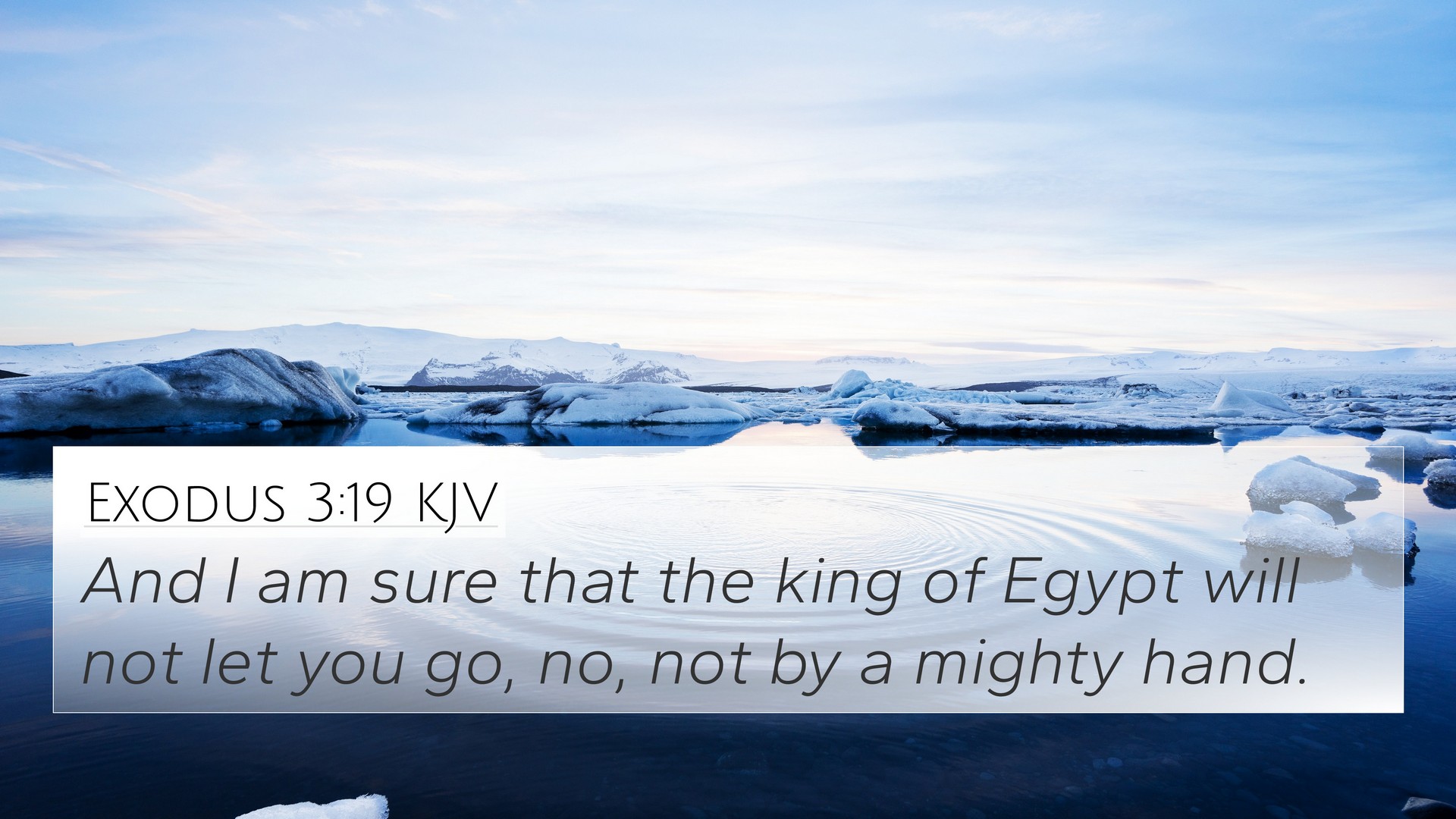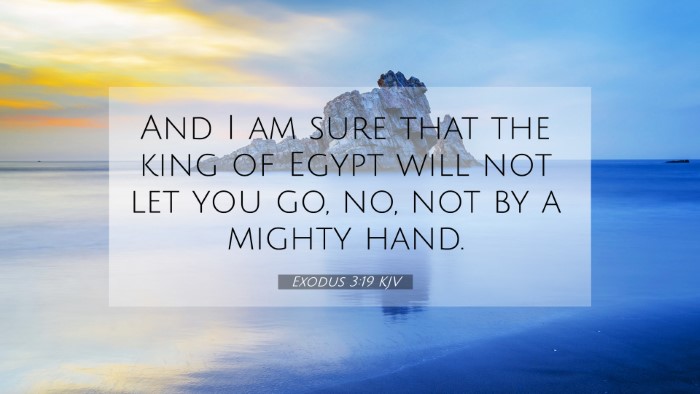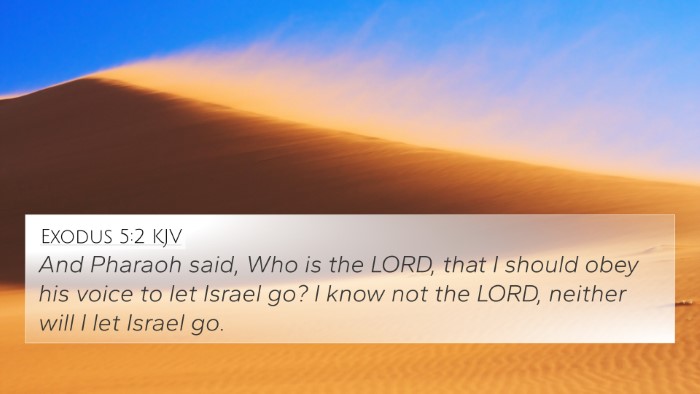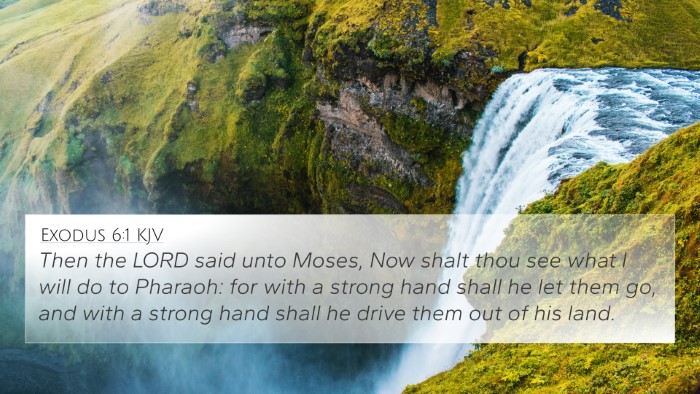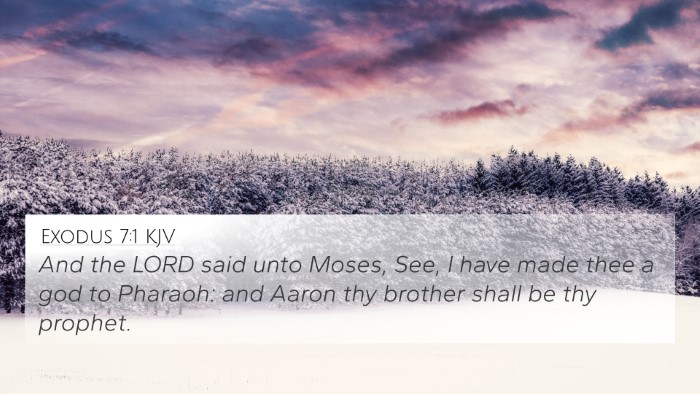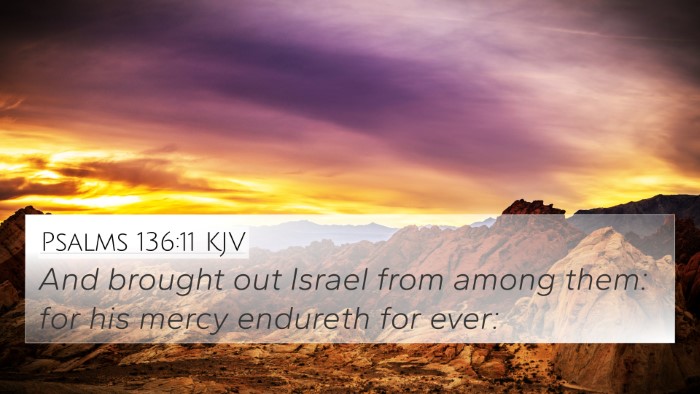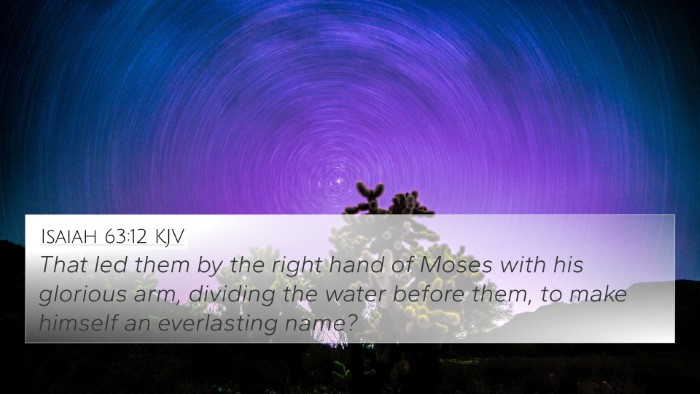Understanding Exodus 3:19
Exodus 3:19 states: "But I am sure that the king of Egypt will not let you go, no, not by a mighty hand." This verse comes from God’s conversation with Moses at the burning bush, where He reveals His plan for the liberation of the Israelites from slavery in Egypt. This pivotal moment in biblical history not only sets the stage for the Exodus but emphasizes the sovereignty of God over human authorities.
Meaning and Interpretation
The meaning behind this verse can be enriched by insights drawn from respected public domain commentaries.
-
Matthew Henry:
Henry emphasizes that God's assurance of Pharaoh's obstinacy teaches us about the resistance to divine will that often arises in the face of God's commands. God's foreknowledge of Pharaoh's heart reflects His omniscience and prepares Moses for the trials ahead.
-
Albert Barnes:
Barnes highlights the demonstrated power of God, indicating that even a mighty ruler like Pharaoh would not comply easily. This prepares us for understanding the eventual plagues and miracles that will demonstrate God's supremacy over the Egyptian gods and Pharaoh's authority.
-
Adam Clarke:
Clarke provides a deeper theological insight indicating that God's forewarning to Moses illustrates His control over the situation. The refusal of Pharaoh serves to magnify God's power as He eventually compels the release of the Israelites through dramatic divine intervention.
Bible Verse Cross-References
To fully appreciate Exodus 3:19, we can look into several Bible verse cross-references that enrich our understanding:
- Exodus 4:21: God foretells Moses of further signs and wonders that He will perform before Pharaoh to compel his heart to release the Israelites.
- Exodus 7:3-4: God plans to harden Pharaoh's heart, illustrating the struggle that would ensue between divine command and human defiance.
- Romans 9:17: Paul references Pharaoh's hard heart to discuss God's sovereignty and the purpose of His mercy and judgement.
- Isaiah 46:10: God's declaration of the end from the beginning echoes the same theme of His omnipotent authority over worldly rulers.
- John 12:40: In the New Testament, this verse refers back to the hardening of hearts, linking God's purposes across the Scriptures.
- Psalm 105:25: God's activity in turning hearts against His people reiterates His overarching control in history.
- Lamentations 3:37: Questions if anything comes to pass apart from God's decree reflect the certainty of God's sovereignty.
Thematic Connections
Exodus 3:19 serves as a key part of the grand narrative of liberation and divine intervention within the Bible. The refusal of King Pharaoh showcases themes such as:
- Divine Sovereignty: The assertion that God's will prevails despite the resistance of powerful figures.
- God’s Foreknowledge: The ability of God to predict human behavior to fulfill His purpose.
- Redemptive History: A narrative thread wherein God acts decisively to redeem His people.
Connections Between Bible Verses
The significance of connections between Bible verses is seen through the lens of Exodus 3:19. The examination of related passages leads to a deeper understanding of God’s plans and actions. Consider the following:
- The relationship between God’s direct communication with Moses and reassurance, as seen in Exodus 3:12 and Exodus 4:12.
- The parallels to Jesus’ pronouncement about the hardness of heart in the New Covenant, indicating that similar defiance exists in every generation.
- The illustrative examples found in the Pentateuch provide a foundational understanding of God’s covenant and the subsequent New Testament references that reflect upon them.
Tools for Bible Cross-Referencing
For those seeking to engage further in cross-referencing Bible study, various tools can enhance your exploration:
- Bible Concordance: A tool that allows readers to locate specific verses across different translations.
- Bible Cross-Reference Guide: A systematic approach to linking verses with similar themes or contexts.
- Bible Reference Resources: Software and books designed to aid in the study of interconnected Bible themes.
In Conclusion
The profound message of Exodus 3:19 echoes throughout the entirety of the scriptures, emphasizing the essential nature of understanding Bible verse parallels and the interconnectedness of God's plan. As one studies this verse, may they find clarity and insight through the themes of divine authority, faithfulness, and the expectation of God’s intervention in history.
